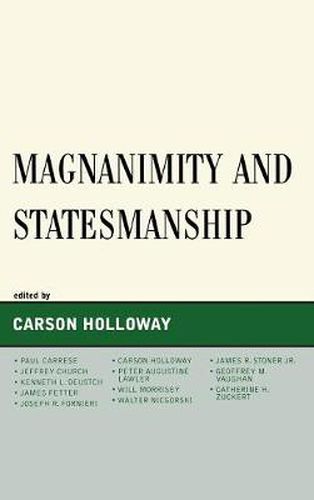Readings Newsletter
Become a Readings Member to make your shopping experience even easier.
Sign in or sign up for free!
You’re not far away from qualifying for FREE standard shipping within Australia
You’ve qualified for FREE standard shipping within Australia
The cart is loading…






Magnanimity and Statesmanship is a collection of papers on the virtue of Aristotelian magnanimity (or greatness of soul) and its relationship to the history of political philosophy and to the art of statesmanship. Aristotle’s account of the great-souled man may seem somewhat alien to the sensibilities of a modern democracy. There is, after all, an inegalitarian element in the great-souled man’s confidence in his moral excellence and hence in his superior worthiness to hold public office. Nevertheless, even modern democratic thinkers admit that democracy needs, at least in certain critical phases in its development, political leaders who far excel their fellow citizens in virtue and wisdom. This book, then, traces the path of magnanimity in the history of political philosophy and examines certain statesmen in light of this virtue, all with a view to addressing the following questions: What is magnanimity, and what is its relationship to political life? Is magnanimity compatible with Christianity, or with the modern commitment to equality? Does modernity still stand in need of such a virtue? Can magnanimity flourish under modern conditions? Are there examples of political leaders whose lives exemplify this virtue and the study of whose political conduct can deepen our understanding of it?
$9.00 standard shipping within Australia
FREE standard shipping within Australia for orders over $100.00
Express & International shipping calculated at checkout
Magnanimity and Statesmanship is a collection of papers on the virtue of Aristotelian magnanimity (or greatness of soul) and its relationship to the history of political philosophy and to the art of statesmanship. Aristotle’s account of the great-souled man may seem somewhat alien to the sensibilities of a modern democracy. There is, after all, an inegalitarian element in the great-souled man’s confidence in his moral excellence and hence in his superior worthiness to hold public office. Nevertheless, even modern democratic thinkers admit that democracy needs, at least in certain critical phases in its development, political leaders who far excel their fellow citizens in virtue and wisdom. This book, then, traces the path of magnanimity in the history of political philosophy and examines certain statesmen in light of this virtue, all with a view to addressing the following questions: What is magnanimity, and what is its relationship to political life? Is magnanimity compatible with Christianity, or with the modern commitment to equality? Does modernity still stand in need of such a virtue? Can magnanimity flourish under modern conditions? Are there examples of political leaders whose lives exemplify this virtue and the study of whose political conduct can deepen our understanding of it?